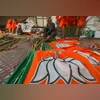As Kerala heads to the polls on Friday, two primary questions come to the forefront: first, will the Bharatiya Janata Party (BJP) be able to win its first seat in the southern state? And second, will Kerala help the Communist Party of India (Marxist), or CPI(M), hold on to its ‘national party’ status?
In 2019, the BJP could only secure 13 per cent of the votes polled in Kerala, and 16 per cent along with its National Democratic Alliance (NDA) allies. This marked a marginal improvement over the BJP’s 10 per cent and NDA’s 11 per cent in 2014. To make its debut in Kerala, the BJP is placing big bets on two seats: Thiruvananthapuram and Thrissur.
Wooing minorities
The controversy surrounding last week’s iconic Thrissur Pooram celebration is also widely believed to favour the BJP’s cause of opening its account in the state. Due to alleged restrictions imposed by police and their reported interference in rituals, the festival could not be celebrated in its full grandeur.
More From This Section
“The common trend in Lok Sabha (LS) elections in Kerala gives the Congress-led United Democratic Front (UDF) the advantage, except in 2004. Normally, the BJP’s vote share in Kerala hovers around 16 per cent and is unlikely to see a rise. The BJP’s stronghold lies in the upper-caste Hindu population. Their challenge lies in the higher share of minorities,” said senior political analyst Sajad Ibrahim K M.
According to the 2011 census, Muslims and Christians jointly constitute around 45 per cent of the state’s population. The Muslim share is as high as 68 per cent in Malappuram, 62 per cent in Ponnani, 41 per cent in Wayanad, 37 per cent in Kozhikode, 31 per cent in Kasaragod and Vadakara, and 26 per cent in Kannur.
Similarly, Idukki has a 42 per cent and Pathanamthitta has a 40 per cent Christian population. There are at least six constituencies where the Christian population is above 20 per cent.


This may be the reason why the BJP is attempting to woo the Christian community in the state.
Suresh Gopi, the BJP candidate in Thrissur, initiated his campaign by reaching out to the Christian community. In the constituency, Christians hold around 21 per cent of the vote share.
In Thiruvananthapuram, where the Congress’ Shashi Tharoor faces a serious challenge from Union Minister Rajeev Chandrasekhar, the party is reaching out to minorities in the coastal region. Minority communities and fishing folk along the coast will be crucial in Thiruvananthapuram as well.
According to senior Congress leader V M Sudheeran, the anti-incumbency factor will play a key role in Kerala.
“In the state, the INDIA (Indian National Developmental Inclusive Alliance) bloc has the upper hand. In Kerala, there is substantial anti-incumbency that may work against the CPI(M) in the state and the BJP at the Centre. We expect a positive outcome. The public is anti-Pinarayi Vijayan; he has failed on all fronts, including the Pooram,” Sudheeran, former president of the Kerala Pradesh Congress Committee, told Business Standard.
CPI(M)’s battle for existence
After losing its electoral influence in West Bengal and Tripura, Kerala has become crucial for the CPI(M)’s survival. Unless it secures at least 11 seats in three states, sustaining itself as a national party will become challenging for the CPI(M). In the 2019 LS polls, the CPI(M) had only won three seats and secured 1.75 per cent of the votes.
“The UDF is increasingly dependent on neutral votes. However, committed votes for them are declining. The CPI(M) is also seeing a decline. Corruption charges against the party, anti-incumbency, and the dire state of state finances may also be critical factors in this election,” Ibrahim said.
Financial concerns led to delays in salary payments for government employees and pension distributions.
“The CPI(M) fielded prominent candidates as it has already lost citadels like West Bengal and Tripura. There will be progress from one seat (the party’s win in Kerala in 2019),” he added.
Industry leaders expressed disappointment that none of the election manifestos discussed sector development.
“No one is talking about industry. They are discussing jobs, but there is no mention of industries that will create them,” said E S Jose of the Kerala Chamber of Commerce & Industry. He added that parties should focus on promoting tourism in the region.
Although industry is not a focal point of elections, the CPI(M)’s status as a national party and whether the BJP can win hearts in the state will be decided on April 26.

)
